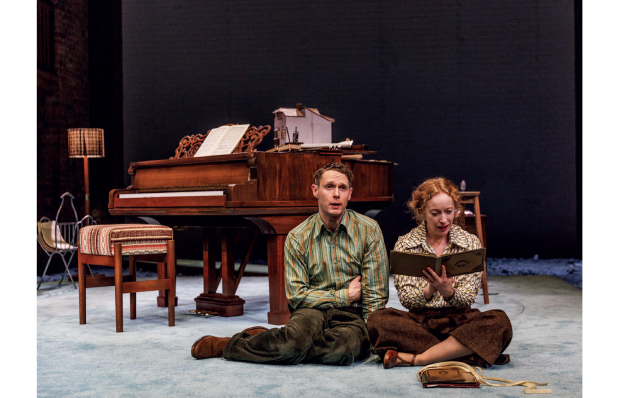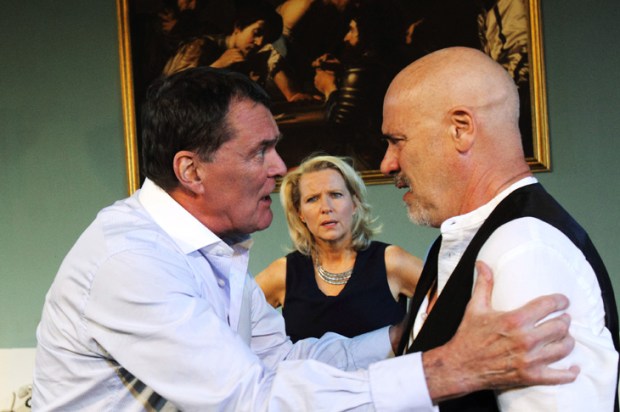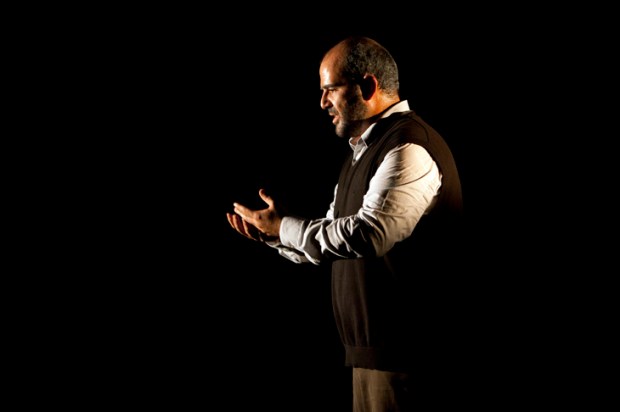
Georg Büchner, a justly neglected German playwright, died at the age of 23 leaving a half-finished script about a mad soldier and his cheating girlfriend. This relic has fascinated dramatists ever since because Büchner is regarded as a visionary left-wing artist cruelly stolen before his time. (Not a moment too soon, if you ask me.)
Jack Thorne is the latest to rehash the leftovers. It’s 1981 and we’re in a divided Berlin. We meet a mopey British squaddie, Woyzeck, who shares a flat with his girlfriend from Derry who has the voice of a seagull and the personality of a dishcloth. The flat pongs because it’s located over a slaughterhouse. Bad choice. Let’s move, says Woyzeck. Great, says the Bogside dishcloth. This starts the story. Woyzeck tries to borrow some money. Nothing happens. He considers selling some stolen weapons. Nothing happens. The Bogside dishcloth is asked to work for a charity. She does so. Nothing happens. Woyzeck joins a medical trial and something happens. His brain goes wrong. By now the play is nearly over and Woyzeck’s damaged noodle must force a conclusion. Which it does. Some characters die. So does the evening. Curtain.
The play’s design is all wrong. Two important subordinate characters, the captain and the doctor, never meet the other characters. The parenthetical subplots overshadow the main story. Sex predominates. Weird sex. Nasty sex. Woyzeck has a horrible squaddie friend who likes to seduce army wives. He forces himself on the Bogside dishcloth in a ghastly encounter that borders on rape. He shares soft-porn grunting sessions with the captain’s wife, a honking snob played by Nancy Carroll. This is a pity. Carroll’s talent is world-class. She can match anyone, even Judi Dench, for stage presence, and when it comes to conveying a certain kind of upper-class gaiety her only serious rival is Emma Thompson. Carroll ought to be dazzling audiences with roles from the great 20th-century repertoire (Coward, Rattigan, Stoppard), but she’s stranded here in a class-war pastiche playing a snotty hate-figure whose only purpose is to gratify the toff-bashing Corbynariat.
Tom Scutt’s grandiose set could win the Turner Prize. He fills the stage with fat oblong slabs, the size of double beds, filled with insulating foam. The fat slabs are on wires. Up and down they go. When they’re up, they’re safe. When they’re down they get thumped, kicked and generally slapped about by the cast, especially by Woyzeck, who head-butts them. The injured slabs spill insulating foam and sometimes empurpled human guts. This kind of random unpleasantness pervades the show. No character has a laudable aim, an interesting sentiment or a worthwhile thought. All the relationships are based on lust, possessiveness, greed or thwarted homosexuality. John Boyega, from a Star Wars film, is perfectly watchable as Woyzeck. There’s a tremendous stillness about him. But when he goes mad he just screams, jabs his fingers and happy-slaps his head. Oh, look, I’m really nuts. These unfelt gestures are probably the fault of poor writing and inept direction. His next role will be better.
There’s a big problem with a Judy Garland show called Through the Mill. The title. If you’ve got a star, put her on the poster. The show blends documentary scenes with musical numbers and as a fringe venture it was overlooked. Wrong title.
Rebranded as Judy!, it arrives in the West End where it belongs. We open in a backstage dressing-room where anxious servants await an absentee diva. When she arrives, she’s charming, droll and cutely vulnerable. We flashback to Judy’s origins as a dumpy bumpkin with a pushy mum and a drunken dad. She signs a movie deal but then what? She’s a child actor at a time when the best roles went to Shirley Temple. Somehow Judy edged her rival aside and landed the part of Dorothy. Having established herself as a superstar, Judy had to move up a level. But when you’re a goddess there’s nowhere to go.
She landed a TV series, which aired live on Sunday evenings. The producers worried about the ‘airline fuel’ she took on board to settle her nerves. But the first show was such a hit that President Kennedy phoned to offer a five-star rave. And then the airline fuel began to show. Viewers complained that the sozzled star was too touchy-feely with her guests. Judy began to fade but she never lost her defiance, grace and humour. This is a wonderful show that could run and run. Writer-director Ray Rackham has found great actresses to represent three different Judys. Lucy Penrose plays her as an awkward geek. Belinda Wollaston, who has a huge soulful voice, shows her as a gorgeous young adult. And Helen Sheals gives us the delicate ageing diva, like a priceless statue, exquisitely carved but made of solid granite.
Got something to add? Join the discussion and comment below.
Get 10 issues for just $10
Subscribe to The Spectator Australia today for the next 10 magazine issues, plus full online access, for just $10.
You might disagree with half of it, but you’ll enjoy reading all of it. Try your first month for free, then just $2 a week for the remainder of your first year.














Comments
Don't miss out
Join the conversation with other Spectator Australia readers. Subscribe to leave a comment.
SUBSCRIBEAlready a subscriber? Log in